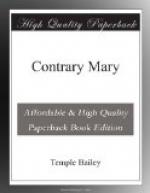“Sometimes, when I think of you, sweetheart, I realize how little there is in me which is deserving of that which you are giving me. When your letters come, I read them and think and think about them. And the thing I think is this: Am I going to be able all my life to live up to your expectations? Don’t expect too much, dear heart. I wonder if I am more cowardly about facing life than other men. Now and then things seem to loom up in front of me—great shadows which block my way—and I grow afraid that I can’t push them out of your path and mine. And if I should not push them, what then? Would they engulf you, and should I be to blame?”
Mary found Leila puzzling over this letter. “It doesn’t sound like Barry,” she said, in a little frightened voice. “May I read it to you, Mary?”
Mary had stopped in for tea on her way home from the office. But the tea waited.
“Barry is usually so—hopeful,” Leila said, when she had finished; “somehow I can’t help—worrying.”
Mary was worried. She knew these moods. Barry had them when he was fighting “blue devils.” She was afraid—haunted by the thought of Jerry. She tried to speak cheerfully.
“You’ll be going over soon,” she said, “and then all the world will be bright to him.”
Leila hesitated. “I wish,” she faltered, “that I could be with him now to help him—fight.”
Mary gave her a startled glance. Their eyes met.
“Leila,” Mary said, with a little gasp, “who told you?”
“Barry”—the tea was forgotten—“before—before he went away.” The vision was upon her of that moment when he had knelt at her feet on their bridal night.
Haltingly, she spoke of her lover’s weakness. “I’ve wanted to ask you, Mary, and when this letter came, I just had to ask. If you think it would be better—if we were married, if I could make a home for him.”
“It wouldn’t be better for you.”
“I don’t want to think about myself,” Leila said, passionately; “everybody thinks about me. It is Barry I want to think of, Mary.”
Mary patted the flushed cheek. “Barry is a fortunate boy,” she said. Then, with hesitation, “Leila, when you knew, did it make a difference?”
“Difference?”
“In your feeling for Barry?”
And now the child eyes were woman eyes. “Yes,” she said, “it made a difference. But the difference was this—that I loved him more. I don’t know whether I can explain it so that you will understand, Mary. But then you aren’t like me. You’ve always been so wonderful, like Barry. But you see I’ve never been wonderful. I’ve always been just a little silly thing, pretty enough for people to like, and childish enough for everybody to pet, and because I was pretty and little and childish, nobody seemed to think that I could be anything else. And for a long time I didn’t dream that Barry was in love with me. I just knew that I—cared.




